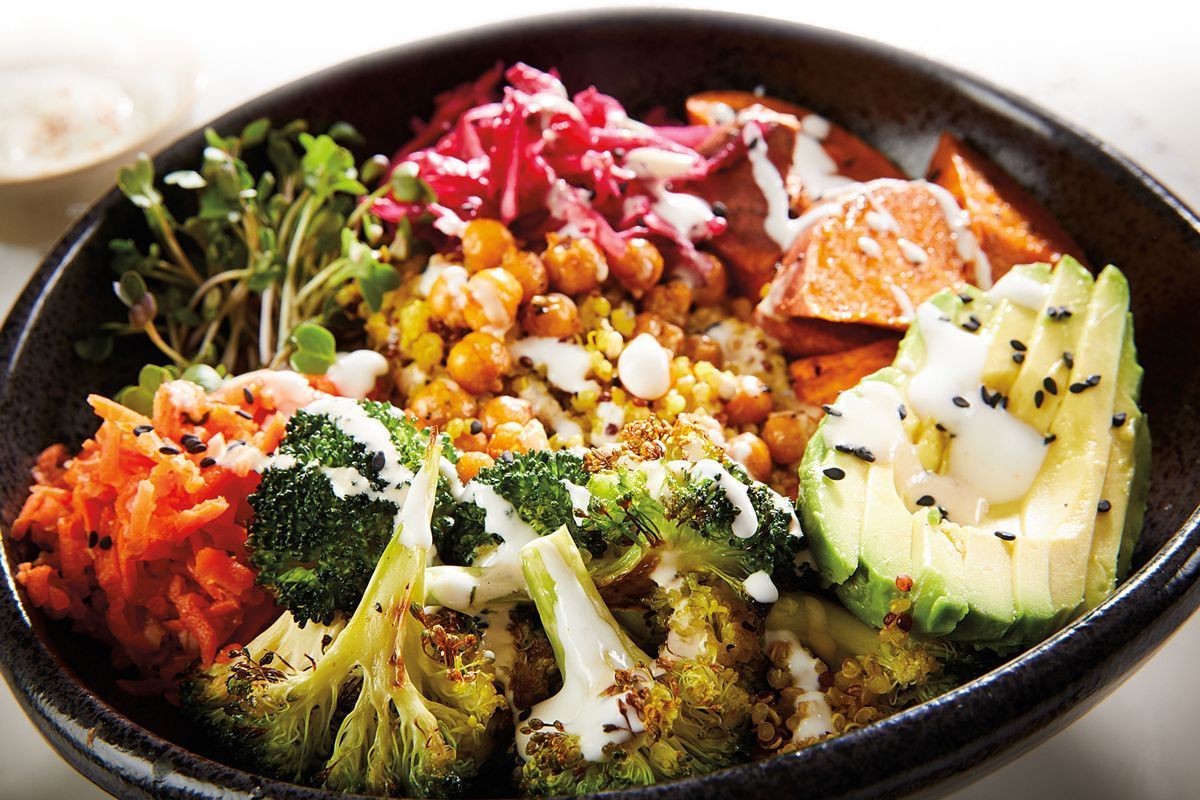
When it comes to food and drink, enjoy everything in moderation. Burgers, pizza, creamy sauces and gravies and other foods that are high in fat and sodium can be fine from time to time, but it’s always best to be mindful of your intake if you’re concerned about your heart health. Balance occasional, more indulgent foods with heart-healthy options that are not only nutritious but delicious.
LEAFY GREENS, PLEASE!
Known for their antioxidant properties, leafy greens are full of vitamins and minerals, especially vitamin K, which may help support proper blood flow in your arteries. Top contenders for the most nutrient-rich greens include kale, microgreens, collard greens, spinach, beet greens, watercress, romaine, Swiss chard, arugula, endive, bok choy and turnip greens, all of which can be found in you Market Produce Department depending on the season. Many other fruits and vegetables, such as tomatoes, cabbage, garlic, carrots, avocados, berries, apples, oranges, bananas, pears and peaches, are packed with important nutrients that play an important part in heart health.
Try our recipes for Orange Arugula Salad with Currants and Blood Oranges or Roasted Salmon Citrus Salad with Leeks and Asparagus
FISH, CHICKEN FOR THE WIN
Salmon, mackerel, sardines and tuna are loaded with omega-3 fatty acids, which are known for their heart benefits. Eating fish regularly and long term can lower total cholesterol levels, blood triglycerides, fasting blood sugar and systolic blood pressure, according to studies. If fish isn’t your jam, consider some of the many high-quality fish oil supplements that can be found in your Market Whole Health Department. Chicken or turkey breast without skin, or lean ground chicken or turkey are also excellent protein options. Even pork shoulder, beef sirloin or lean ground beef that’s at least 93% lean are good options, when enjoyed as part of a balanced diet. Ask your Market Butcher for recommendations.
Try our recipes for Salmon with Citrus & Fennel or SunButter Sauce & Chicken Satay
ALTERNATIVE PROTEINS
For those who don’t consume meat or those who want an even more balanced diet, there are many protein alternatives to choose from at your Market. Beans, peas and lentils are sensational in soups and stews. Eggs, tofu, unsalted nuts, seeds and nut butters, such as almond or peanut butter, can easily take the place of meats.
Try our recipes for Superfood Buddha Bowls or Khalsa Salsa’s Chipotle Sweet Potato Soup with Black Bean Salsa.
NUTS IN MODERATION
Nuts are a sensational snack food, especially when you’re on the move. Research suggests that eating nuts may lower bad cholesterol and triglyceride levels, which play a major role in the buildup of deposits called plaques in your arteries. Nuts contain unsaturated fatty acids and other nutrients like fiber, vitamin E and omega-3 fatty acids, but they also can be high in calories, so portions are important. The American Heart Association recommends eating about four servings of unsalted nuts a week; one serving is a small handful of whole nuts or 2 tablespoons of nut butter. Choose raw or dry-roasted nuts rather than nuts cooked in oil.
Try our recipes for Oregon Wild Rice with Butternut, Mushrooms, Hazelnuts and Cranberries or Ground Up PDX’s Healthy Gingersnap Shake.
HEALTHY FATS, OILS
Instead of butter for cooking, consider healthier unsaturated fats, such as olive, peanut, safflower, soybean or sunflower oils. Oil-based salad dressings, like balsamic vinaigrette or Italian dressing, are typically a healthier choice than creamy dressings.
Try Blue Bus Cultured Foods’ recipe for Grilled Salmon & Turnips Salad with Lemon-Garlic Dill Kraut
WHOLE GRAINS MAKE THE GRADE
When it comes to breads, bagels, English muffins, cereals, pastas and tortillas, look for products where whole wheat or another whole grain is listed first in the ingredient list are labeled 100% whole grain. Whole grains include all three nutrient-rich parts of the grain – germ, endosperm and bran. Common whole grains include whole wheat, brown or wild rice, oats, rye, barley, buckwheat and quinoa.
Try our recipes for Baked Stuffed Honeycrisp Apples with Oatmeal Crumble or Fresh Basket Ricotta on Whole Wheat Toast
DAIRY & YOUR HEART
Dairy foods contain saturated and ruminant trans fats, which can increase LDL cholesterol, commonly known as bad cholesterol because it can increase the risk of heart disease. But not all dairy products are bad for your heart. To reap the benefits of dairy, including protein and calcium, look for fat-free or low-fat options when you’re shopping for milk, yogurt, cheese and cottage cheese. Many of these foods have a neutral effect on heart health, meaning they don’t increase or decrease the risk of heart disease. Alternatives to dairy milk include soy, almond, oat or rice milk with added calcium and no added sugar.
Try our recipe for Mother’s Day Yogurt Parfaits, which are excellent any day!
THREE CHEERS FOR DARK CHOCOLATE!
Dark chocolate is rich in antioxidants like flavonoids, which can help boost heart health. Studies show that eating small amounts of dark chocolate – less than 6 servings a week – may decrease the risk of coronary heart disease, stroke and diabetes. When shopping, choose a high-quality dark chocolate with a cocoa content of at least 70%.
Try our recipes for Cranberry Almond Chocolate Bark or Momo Cocoa Co’s Gluten Free & Vegan Momo Brownies
EXERCISE PLAYS A KEY ROLE
In addition to adhering to a healthy diet, regular exercise can have a profound effect on cardiovascular health. Regular exercise has been proven to lower blood pressure, help maintain a healthy weight, strengthen muscles, lower stress and reduce inflammation in the body. Before making drastic changes to your diet or exercise regimen, be sure to consult with your health care provider.
For more on heart-healthy foods:
Dairy and your heart health
7 Heart Benefits of Exercise
15 Incredibly Heart-Healthy Foods
Heart-Healthy Foods: Shopping List
Nuts and your heart: Eating nuts for heart health
Explore More Topics
Related Posts
- Going Gluten-Free in Oregon? Market of Choice Makes It Delicious.
If you’re newly gluten-free, welcome to the club—membership includes great snacks, excellent pancakes, and the occasional moment of staring at a menu like it’s written in ancient runes. Don’t worry. You’re not alone, and you definitely don’t have to give up delicious food. In fact, thanks to Oregon’s vibrant community of gluten-free makers (many of which you’ll find right here at Market of Choice), going gluten-free has never tasted better.
- Kickstart the Year with an Alcohol-Free January
Join the alcohol-free January movement with a wide range of zero-proof drink options at Market of Choice.



